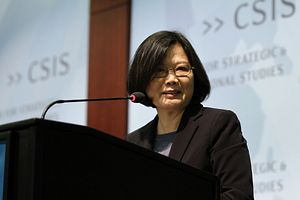KMT spokesman Eric Huang has published the latest in a long line of articles asking the opposition to clarify its policy agenda. The allusion is that the DPP’s presidential candidate, Tsai Ing-wen, has not presented a clear position on important international and cross-strait issues. In fact, the exact opposite is true here in Taiwan.
On the South China Sea, for example, which Mr. Huang writes about in his most recent article, Dr. Tsai has presented a nuanced and well thought-out message that seeks to reduce tension and confrontation in the area. Both are essential in an area with growing stakes for the U.S., China, and the claimants in the area.
Dr. Tsai’s three point agenda includes a call for all parties to base their principles and positions on UNCLOS, maintain the freedom of navigation and flight in the area, and work to peacefully resolve this issue. Underlying these points is Taiwan’s sovereignty in Taiping Island and the surrounding area. It’s a principle the DPP has made very clear, including in a public statement released on May 27.
Therefore, it is disappointing to see Mr. Huang write that Dr. Tsai “continues to avoid statements that clearly state to voters that if elected, she will protect the ROC’s sovereignty claims.” Not only does it consciously misrepresent the DPP’s agenda in this important area of Taiwan’s foreign affairs, it is also misleading to Taiwanese voters in the final stages of the election campaign.
Our principles on the South China Sea play a key part in our message: a future DPP administration will build a steady and consistent regional environment in order to tackle difficult economic and social reform at home. Over the course of this election, we have attempted to explain how we plan to carry this out.
On September 22 this year, Dr. Tsai released a 1,700-word foreign policy agenda. Recognizing the need for pragmatism amid Taiwan’s diplomatic challenges, a future DPP administration will encourage local governments, NGOs, and the private sector to play a more prominent role in enhancing Taiwan’s international space.
She also pledged to direct more resources to build closer relations with our neighbors in Southeast Asia. Under the DPP’s ‘New Southbound Policy,’ Taiwan will forge stronger multilateral exchanges – education, culture, tourism, and trade – with our friends from Southeast Asia and India. It recognizes the area’s growing importance for Taiwan, particularly as we seek to diversify our economy and trade.
In fact, the DPP’s international agenda is clear. The KMT’s is less so. Ten bullet points encompass the entirety of KMT candidate Eric Chu’s foreign policy. During a highly anticipated diplomatic reception on December 15, Dr. Chu said: “Today is not the time to present my future policies for Taiwan, but it’s a time to get together to celebrate Christmas and to [say] farewell to 2015.”
For the KMT, it is rarely a good time to present their future agenda. Perhaps for good reason. Both the KMT and Dr. Chu have left a track record of broken election promises stretching from subway construction to affordable housing. The latest, of course, was on his candidacy itself. He publicly claimed no less than 26 times that he would not run for the presidency.
We firmly believe that instead of challenging the DPP to “clarify” areas where the DPP has already been quite clear on, the KMT should challenge their own candidate to do the same.
Vincent Y. Chao is the Deputy Director of the DPP’s International Affairs Department.

































